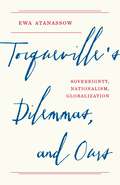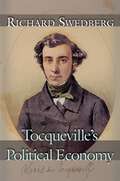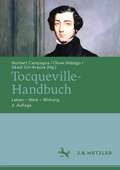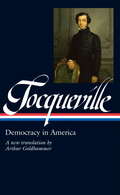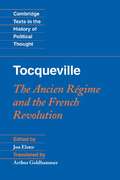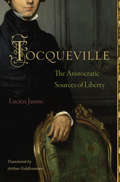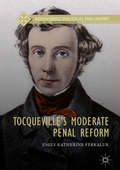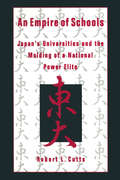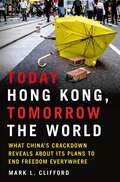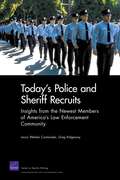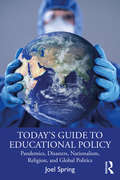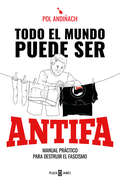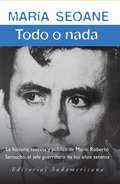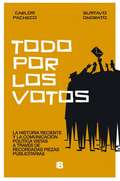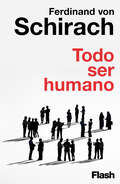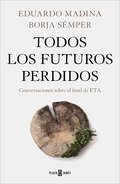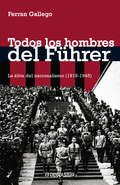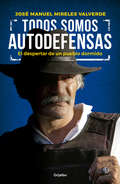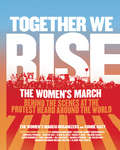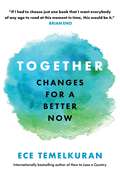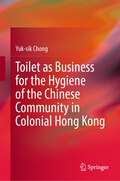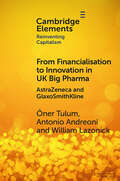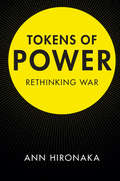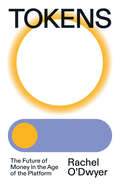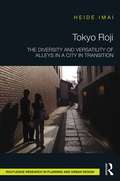- Table View
- List View
Tocqueville's Dilemmas, and Ours: Sovereignty, Nationalism, Globalization
by Ewa AtanassowHow Tocqueville’s ideas can help us build resilient liberal democracies in a divided worldHow can today’s liberal democracies withstand the illiberal wave sweeping the globe? What can revive our waning faith in constitutional democracy? Tocqueville’s Dilemmas, and Ours argues that Alexis de Tocqueville, one of democracy’s greatest champions and most incisive critics, can guide us forward.Drawing on Tocqueville’s major works and lesser-known policy writings, Ewa Atanassow shines a bright light on the foundations of liberal democracy. She argues that its prospects depend on how we tackle three dilemmas that were as urgent in Tocqueville’s day as they are in ours: how to institutionalize popular sovereignty, how to define nationhood, and how to grasp the possibility and limits of global governance. These are pivotal but often neglected dimensions of Tocqueville’s work, and this fresh look at his writings provides a powerful framework for addressing the tensions between liberalism and democracy in the twenty-first century.Recovering a richer liberalism capable of weathering today’s political storms, Tocqueville’s Dilemmas, and Ours explains how we can reclaim nationalism as a liberal force and reimagine sovereignty in a global age—and do so with one of democracy’s most discerning thinkers as our guide.
Tocqueville's Political Economy
by Richard SwedbergAlexis de Tocqueville (1805-59) has long been recognized as a major political and social thinker as well as historian, but his writings also contain a wealth of little-known insights into economic life and its connection to the rest of society. In Tocqueville's Political Economy, Richard Swedberg shows that Tocqueville had a highly original and suggestive approach to economics--one that still has much to teach us today. Through careful readings of Tocqueville's two major books and many of his other writings, Swedberg lays bare Tocqueville's ingenious way of thinking about major economic phenomena. At the center of Democracy in America, Tocqueville produced a magnificent analysis of the emerging entrepreneurial economy that he found during his 1831-32 visit to the United States. More than two decades later, in The Old Regime and the Revolution, Tocqueville made the complementary argument that it was France's blocked economy and society that led to the Revolution of 1789. In between the publication of these great works, Tocqueville also produced many lesser-known writings on such topics as property, consumption, and moral factors in economic life. When examined together, Swedberg argues, these books and other writings constitute an interesting alternative model of economic thinking, as well as a major contribution to political economy that deserves a place in contemporary discussions about the social effects of economics.
Tocqueville-Handbuch: Leben – Werk – Wirkung
by Oliver Hidalgo Norbert Campagna Skadi Siiri KrauseDas Handbuch gewährt einen umfassenden Überblick über Tocquevilles Leben, Werk und Wirkung auf dem aktuellen Stand der historischen, philosophischen und sozialwissenschaftlichen Forschung. Dem äußerst facettenreichen, in Deutschland aber nach wie vor unterschätzten Autor widmet dieser Band eine ebenso kompakte wie systematische Darstellung, die auf der Basis eines strukturierten Zugriffs und unter Berücksichtigung aller seiner Schriften verschiedene Aspekte seines Denkens erfasst. Deutschsprachige Leserinnen und Leser können sich schnell und zielführend fundierte Informationen über Tocquevilles Theorien, seine zentralen Begriffe sowie die wichtigsten Einflüsse verschaffen. Zugleich dient das Handbuch als Kompass zur Einordnung von Tocquevilles Analysen in gegenwärtige Debatten und Themengebiete und gibt anschlussfähige Hinweise für die Konzeption von Projekten in Forschung und Lehre.
Tocqueville: Democracy in America
by Alexis De TocquevilleAlexis de Tocqueville, a young aristocratic French lawyer, came to the United States in 1831 to study its penitentiary systems. His nine-month visit and subsequent reading and reflection resulted in Democracy in America (1835-40), a landmark masterpiece of political observation and analysis. Tocqueville vividly describes the unprecedented social equality he found in America and explores its implications for European society in the emerging modern era. His book provides enduring insight into the political consequences of widespread property ownership, the potential dangers to liberty inherent in majority rule, the importance of civil institutions in an individualistic culture dominated by the pursuit of material self-interest, and the vital role of religion in American life, while prophetically probing the deep differences between the free and slave states. The clear, fluid, and vigorous translation by Arthur Goldhammer is the first to fully capture Tocqueville's achievements both as an accomplished literary stylist and as a profound political thinker.
Tocqueville: The Ancien Régime and the French Revolution
by Arthur Goldhammer Jon Elster Alexis De ToquevilleThis new translation of an undisputed classic aims to be both accurate and readable. Tocqueville's subtlety of style and profundity of thought offer a challenge to readers as well as to translators. As both a Tocqueville scholar and an award-winning translator, Arthur Goldhammer is uniquely qualified for the task. In his Introduction, Jon Elster draws on his recent work to lay out the structure of Tocqueville' argument. Readers will appreciate The Ancien Régime and the French Revolution for its sense of irony as well as tragedy, for its deep insights into political psychology and for its impassioned defense of liberty.
Tocqueville: The Aristocratic Sources of Liberty
by Lucien JaumeA major intellectual biography of Toqueville that restores democracy in America to its essential contextMany American readers like to regard Alexis de Tocqueville as an honorary American and democrat—as the young French aristocrat who came to early America and, enthralled by what he saw, proceeded to write an American book explaining democratic America to itself. Yet, as Lucien Jaume argues in this acclaimed intellectual biography, Democracy in America is best understood as a French book, written primarily for the French, and overwhelmingly concerned with France. "America," Jaume says, "was merely a pretext for studying modern society and the woes of France." For Tocqueville, in short, America was a mirror for France, a way for Tocqueville to write indirectly about his own society, to engage French thinkers and debates, and to come to terms with France's aristocratic legacy.By taking seriously the idea that Tocqueville's French context is essential for understanding Democracy in America, Jaume provides a powerful and surprising new interpretation of Tocqueville's book as well as a fresh intellectual and psychological portrait of the author. Situating Tocqueville in the context of the crisis of authority in postrevolutionary France, Jaume shows that Tocqueville was an ambivalent promoter of democracy, a man who tried to reconcile himself to the coming wave, but who was also nostalgic for the aristocratic world in which he was rooted—and who believed that it would be necessary to preserve aristocratic values in order to protect liberty under democracy. Indeed, Jaume argues that one of Tocqueville's most important and original ideas was to recognize that democracy posed the threat of a new and hidden form of despotism.
Tocqueville’s Moderate Penal Reform (Recovering Political Philosophy)
by Emily Katherine FerkalukThis book presents an interpretive analysis of the major themes and purpose of Alexis de Tocqueville’s and Gustave de Beaumont’s first work, On the Penitentiary System, thereby offering new insights into Tocqueville as a moderate liberal statesman. The book explores Tocqueville’s thinking on penitentiaries as the best possible solution to recidivism, his approach to colonial imperialism, and his arguments on moral reformation of prisoners through a close reading of Tocqueville’s first published text. The unifying political concept of all three discussions is Tocqueville’s underlying concern to pursue moderation between institutional and imaginative extremes in order to maintain liberal values. In both thinking moderately and advocating for moderate political action, Tocqueville’s On the Penitentiary System renews an emphasis on the importance of civic engagement and the balance between philosophy and praxis.
Todai: Gods and Humans in the Japanese Empire
by Robert CuttsBased on in-depth analysis, extensive interviews, and a journalist's keen insight, An Empire of Schools provides a new framework to explore the misunderstandings that have arisen between Japan and the United States. The vital determining issue that complicates U.S.-Sino communications, Cutts says, is not the cultural incompatibilities of the people or economies but the fact that all Japanese leaders emerge from the same educational treadmill or "cartels of the mind." This revered system, crowned by five national and private universities, and from which almost all Japanese leaders emerge, teaches its students that they are inherently incapable of sharing their values, civic or personal, with those of any other civilization. Describing an educational system that has been left fundamentally unchanged since the Meiji Empire, Cutts depicts the elites who graduate from the system, describes what ethical philosophy is imparted to those graduates, and warns of the dangers of nationalist elitism that arise from the system. Filled with personal anecdotes as well as critical interviews, An Empire of Schools traces the potential consequences to Japan and the Pacific Rim of an educational system that begins imparting an elitist doctrine in kindergarten that extends to the highest levels of Japanese government.
Today Hong Kong, Tomorrow the World: What China's Crackdown Reveals About Its Plans to End Freedom Everywhere
by Mark L. CliffordA gripping history of China's deteriorating relationship with Hong Kong, and its implications for the rest of the world.For 150 years as a British colony, Hong Kong was a beacon of prosperity where people, money, and technology flowed freely, and residents enjoyed many civil liberties. In preparation for handing the territory over to China in 1997, Deng Xiaoping promised that it would remain highly autonomous for fifty years. An international treaty established a Special Administrative Region (SAR) with a far freer political system than that of Communist China—one with its own currency and government administration, a common-law legal system, and freedoms of press, speech, and religion.But as the halfway mark of the SAR’s lifespan approaches in 2022, it is clear that China has not kept its word. Universal suffrage and free elections have not been instituted, harassment and brutality have become normalized, and activists are being jailed en masse. To make matters worse, a national security law that further crimps Hong Kong’s freedoms has recently been decreed in Beijing. This tragic backslide has dire worldwide implications—as China continues to expand its global influence, Hong Kong serves as a chilling preview of how dissenters could be treated in regions that fall under the emerging superpower’s control.Today Hong Kong, Tomorrow the World tells the complete story of how a city once famed for protests so peaceful that toddlers joined grandparents in millions-strong rallies became a place where police have fired more than 10,000 rounds of tear gas, rubber bullets and even live ammunition at their neighbors, while pro-government hooligans attack demonstrators in the streets. A Hong Kong resident from 1992 to 2021, author Mark L. Clifford has witnessed this transformation firsthand. As a celebrated publisher and journalist, he has unrivaled access to the full range of the city’s society, from student protestors and political prisoners to aristocrats and senior government officials. A powerful and dramatic mix of history and on-the-ground reporting, this book is the definitive account of one of the most important geopolitical standoffs of our time.
Today's Police and Sheriff Recruits
by Greg Ridgeway Laura Werber CastanedaFor much of the past decade, police and sheriff's departments faced considerable challenges in attracting and retaining recruits. This volume summarizes a 2008-2009 survey fielded to recent police officer and sheriff's deputy recruits nationwide. The authors focus on how understanding modern recruits can help departments refine their recruitment practices and develop a workforce well suited to community-oriented policing.
Today’s Guide to Educational Policy: Pandemics, Disasters, Nationalism, Religion, and Global Politics
by Joel SpringIn his latest book, Joel Spring covers major political, economic and social issues affecting US and global education policy today. Crafted to evoke classroom discussion, this book explores contemporary issues such as the pandemic, institutional racism, religious controversies, nationalism and immigration, increased reliance on online instruction, climate change, economics of education and the deep state in education. Giving students the opportunity to engage in critical thinking and explore the growing sense that US and global education is in distress and in need of fundamental transformation, this book forces readers to examine their own values and how they might apply this thinking to their own education policy and practice.
Todo el mundo puede ser ANTIFA: Manual práctico para destruir el fascismo
by Pol AndiñachTodo el mundo puede ser ANTIFA es la respuesta a los discursos de odio que, en los últimos tiempos, intentan polarizar y fragmentar nuestra sociedad. Estamos viendo que vuelven ideas y comportamientos muy parecidos a los que tuvieron los fascismos clásicos. Discursos basados en el odio hacia las minorías y hacia colectivos oprimidos, y que defienden la hegemonía privilegiada de siempre. Ante esto, no tomar posición es dejar que sigan avanzando. Todo el mundo puede ser ANTIFA insta a declararnos categóricamente antifascistas. Un movimiento muchas veces desprestigiado y reducido a marginal, radical y violento, pero que, en realidad, lo que pretende es hacer de este mundo un lugar mejor. Este libro da ejemplos y muestra formas de luchar contra el fascismo que no implican la confrontación física, pero que, a la vez, son rotunda e innegablemente antifascistas. Todo el mundo, tenga la edad, el tiempo o las posibilidades que tenga, puede encontrar su forma de participar en esta lucha. Y así debe ser, porque nos necesitamos a todas. Porque todo el mundo puede -y debería- ser antifa. El fascismo no se cura leyendo. El fascismo no se cura viajando. El fascismo se cura combatiéndolo en todos los frentes posibles. Mi abuela puede declararse antifascista, pero probablemente no irá a reventar una manifestación neonazi. Mi hermano podría, pero igual no quiere implicarse tanto, ya sea por tiempo, por exposición o por el motivo que sea. ¿Esto significa que deben quedarse fuera de esta lucha? En absoluto. Ambos pueden llevar a cabo acciones innegablemente antifascistas. Lo deja muy claro el compañero Paul,de un grupo antifa de Reino Unido: "A la hora de decidir las tácticas más eficaces hay que estar más abierto a la idea del antifascismo de espectro completo, sin hacer de la violencia un fetiche. Lo más importante es ganar".
Todo o nada: La historia secreta y la historia pública del jefe guerrillero Mario Roberto San
by María SeoaneA través de innumerables cartas personales, el relato de sus familiares,testimonios de militantes del PRT-RRP y de miembros jerárquicos delejército, el personaje adquiere una dimensión matizada y precisa. No es habitual que una investigación sobre un personaje tabú seaobjetiva. Habrá quienes deseen que el personaje resulte obligatoriamenteexecrable. Otros, por el contrario, solo estarán dispuestos a confirmarque se trataba de un héroe impoluto. La verdad es lo que menos interesaa todos ellos y, en consecuencia, la investigación más rigurosa solopuede constituirse en un obstáculo gratuito.En Todo o nada María Seoane no elige un camino más fácil. Conminuciosidad investiga los pliegues desconocidos de la vida de MarioRoberto Santucho, en donde el jefe guerrillero se manifiesta como unpolítico práctico así como un alucinando soñador de una utopíasangrienta. Abandona el territorio de la iconografía mítica paraingresar, en carne y hueso, y como uno de los protagonistas de unadécada trágica e imborrable, en aquello que hoy ya parece ser,afortunadamente, parte del pasado argentino.
Todo por los votos
by Carlos Pacheco Gustavo OnoratoLa historia reciente y la comunicación política vistas a través de recordadas piezas publicitarias. Todo por los votos es una investigación periodística que combina la historia política reciente con las claves de la comunicación política y de la publicidad. "La publicidad es una poderosa herramienta de conocimiento antropológico de las sociedades", afirman los autores. Incluye la reflexión y el testimonio de publicistas, sociólogos y analistas políticos, como Francisco Vernazza, Óscar Bottinelli, Adolfo Garcé, Esteban Valenti, Álvaro Ahunchain, Claudio Invernizzi, José M. Busquets, José L. Costa, José M. Reyes y Gerardo Caetano. Piezas como "la paradoja" (1989), eslóganes como "Batlle le canta la justa" (1994-1999) y "fotos robadas" a José Mujica (2009) son transformadas en el libro en claves para comprender los desafíos a los que se enfrentaron los uruguayos en las últimas décadas. Todo por los votos comienza en 1980 y abarca en total seis elecciones nacionales y dos referéndums. Paso a paso, votación tras votación, el libro responde varias preguntas: ¿la publicidad puede crear un candidato o torcer una elección? ¿Cuál es el papel de los publicistas y cuál el de los candidatos? ¿Cuánto pesa un buen eslogan? ¿Qué rol desempeña la publicidad en una elección cabeza a cabeza? En los dos capítulos finales, los autores reflexionan sobre el perturbador papel de las redes sociales en las campañas políticas y respecto del perfil del votante uruguayo en el Uruguay de hoy, a la vez que se preguntan: ¿aumentó el riesgo de juego sucio? ¿Qué votan los uruguayos?
Todo ser humano
by Ferdinand von SchirachUn ensayo inédito de Ferdinand von Schirach. Una defensa acérrima de seis nuevos y necesarios derechos humanos. La Declaración de Independencia de Estados Unidos (1776) y la Declaración de los Derechos del Hombre y del Ciudadano en Francia (1789) sentaron las bases de nuestra sociedad moderna, de nuestra libertad y de nuestros derechos inalienables. Resulta sorprendente que aquellas declaraciones no reflejaran la realidad en la que la sociedad vivía inmersa. Los grandes manifiestos de la humanidad reclamaban un orden social que aún no existía. Eran utopías y, sin embargo, acabaron por materializarse. Siguiendo la estela de aquellos documentos cruciales para la humanidad, Ferdinand von Schirach realiza un magnífico repaso por los retos a los que nos enfrentamos en la actualidad. La globalización, la digitalización, la inteligencia artificial, el cambio climático: los peligros de nuestro presente eran inimaginables hace 200 años. La aparición de unos nuevos derechos humanos que sumar a los por todos conocidos se hace imperiosa. Hemos de volver a decidir sobre nuestra sociedad y cómo queremos que sea. ¿No es esta, acaso, la verdadera tarea de nuestro tiempo? «He escrito estos apuntes porque la dignidad de los seres humanos debe ser inviolable. No se puede convertir a nadie en un simple objeto. Hoy, como siempre, debemos seguir defendiendo esta gran idea de la Ilustración. Los derechos aquí propuestos solo sirven a este objeto». De Terror se dijo:«Teatro en su máxima expresión».The Sunday Times «Una historia tan compleja que seguirás pensando en ella mucho después de que se falle la suerte del acusado».The Times «Von Schirach se nutre del legado del drama clásico como un foro donde considerar los dilemas humanos más acuciantes».Financial Times De Castigo se dijo:«Una y otra vez, me sorprende la capacidad de Ferdinand von Schirach para captar lo contradictorio en los entornos más reducidos, para dibujar el gran espacio emocional en pocas palabras. Una y otra vez, me siento conmovido por esta combinación de precisión no sentimental y maravillosa, la empatía filantrópica que hace que sus textos sean incomparables».Michael Haneke
Todos los futuros perdidos: Conversaciones sobre el final de ETA
by Eduardo Madina Borja SémperUn libro lleno de valentía, honestidad y verdad. Este libro comienza con el recuerdo de un día feliz, el 20 de octubre de 2011, en el que la banda terrorista ETA anunció su cese definitivo. Diez años después de aquella fecha histórica, un centenario caserío en Aretxabaleta, cercano a Mondragón, albergaba esta emocionante conversación sobre uno de los episodios más oscuros de nuestro pasado reciente. Eduardo Madina y Borja Sémper eligieron un simbólico cruce de caminos en el corazón de Euskadi porque la suya es una historia de vidas paralelas con muchos puntos de conexión. Nacidos en Bilbao e Irun con apenas unas horas de diferencia, su compromiso les convirtió desde muy jóvenes en objetivos de la violencia. Ambos vivieron los años más duros del terrorismo en primera línea y desde distintas formaciones políticas. Nunca se plantearon renunciar, a pesar del coste que supuso en sus vidas. Todos los futuros perdidos es un conmovedor testimonio contra el miedo, el silencio y el olvido. Un libro imprescindible que reivindica la memoria colectiva de un pasado que no debió existir al tiempo que celebra la mayor de las victorias, la de todos los futuros que se ganaron.
Todos los hombres del Führer: La élite del nacionalismo (1919-1945)
by Ferran GallegoTodos los nombres relevantes de aquellos que hicieron los sueños de Hitler realidad: Los artífices del III Reich. Un sistema político, económico, social, militar y cultural tan complejo como el nazismo sólo pudo levantarse gracias a la decidida participación de muchas personas. Himmler, Göring, Rosenberg, Goebbels, Drexler, Strasser, Röhm, Speer, entre otros destacados jerarcas nacionalsocialistas, fueron algunos de los responsables de la construcción de aquella barbarie. Sin ellos, Hitler, el Führer, su conductor, no hubiera podido sembrar el terror en su propio país y en Europa. Como explica el profesor Gallego en la brillante conclusión de este trabajo -destinado a convertirse en un clásico de la historiografía española sobre la materia- el nacionalsocialismo fue un proyecto social que se instaló en la modernidad y que procedía de sus mismas actitudes culturales. Premio Internacional de Ensayo Caballero Bonald Reseña:«Ferran Gallego es un caso bastante excepcional en España por la dimensión literaria de su prosa, algo especialmente perceptible en este libro.»Jacinto Antón, El País
Todos somos autodefensas: El despertar de un pueblo dormido
by José Manuel Mireles Valverde«Mireles no es el caudillo estoico, insensible, inmutable y de mirada fría que presentan los medios de comunicación. Este libro es una ventana al corazón de un hombre que llora, ríe, sufre y disfruta la vida» Pablo Alarcón-Cháires En 2004 Michoacán se resquebrajó. Ese año, los cárteles, insatisfechos con las ganancias obtenidas con el tráfico de drogas, diversificaron sus actividades e incursionaron en la extorsión, el secuestro, el pillaje y, en el colmo del sadismo, la violación y la tortura. Después de una década de violencia desatada, los habitantes de la zona reaccionaron. Empobrecidos por los embates del crimen, olvidados por las autoridades, furiosos y hartos, decidieron tomar la justicia en sus manos. José Manuel Mireles Valverde es una figura central en este panorama. Fundador de las autodefensas enla Tierra Caliente, luchó durante más de un año contra los cárteles, pero fue apresado en junio de 2014 durante un operativo federal duramente criticado. Entonces debió emprender otras batallas: la jurídica -por salir de prisión- y la moral -para no doblegar su espíritu-. Y triunfó. Mireles ha convertido esa "digna rabia" en la crónica completa de las autodefensas michoacanas. En este libro, que se remonta a la herencia purépecha y la pelea que los terracalenteños dieron durante la Revolución mexicana y la Guerra cristera, el médico y comandante narra a detalle la génesis del movimiento de autodefensas, así como la adrenalina de los combates y las negociaciones frustrantes con el gobierno, que culminaron en una traición histórica.
Together We Rise: Behind the Scenes at the Protest Heard Around the World
by Cond 233 Nast Women'S March Organizers The<P>In celebration of the one-year anniversary of Women’s March, this gorgeously designed full-color book offers an unprecedented, front-row seat to one of the most galvanizing movements in American history, with exclusive interviews with Women’s March organizers, never-before-seen photographs, and essays by feminist activists. <P>On January 21, 2017, the day after Donald J. Trump’s inauguration, more than three million marchers of all ages and walks of life took to the streets as part of the largest protest in American history. In red states and blue states, in small towns and major urban centers, from Boise to Boston, Bangkok to Buenos Aires, people from eighty-two countries—on all seven continents—rose up in solidarity to voice a common message: Hear our voice.It became the largest global protest in modern history. <P>Compiled by Women’s March organizers, in partnership with Condé Nast and Glamour magazine Editor in Chief Cindi Leive, Together We Rise—published for the one-year anniversary of the event—is the complete chronicle of this remarkable uprising. For the first time, Women’s March organizers—including Bob Bland, Cassady Fendlay, Sarah Sophie Flicker, Janaye Ingram, Tamika Mallory, Paola Mendoza, Carmen Perez, and Linda Sarsour —tell their personal stories and reflect on their collective journey in an oral history written by Jamia Wilson, writer, activist and director of The Feminist Press. <P>They provide an inside look at how the idea for the event originated, how it was organized, how it became a global movement that surpassed their wildest expectations, and how they are sustaining and building on the widespread outrage, passion, and determination that sparked it. <P>Together We Rise interweaves their stories with "Voices from the March"—recollections from real women who were there, across the world—plus exclusive images by top photographers, and 20 short, thought-provoking essays by esteemed writers, celebrities and artists including Rowan Blanchard, Senator Tammy Duckworth, America Ferrera, Roxane Gay, Ilana Glazer, Ashley Judd, Valarie Kaur, David Remnick, Yara Shahidi, Jill Soloway, Jia Tolentino, Congresswoman Maxine Waters, and Elaine Welteroth. <P>An inspirational call to action that reminds us that together, ordinary people can make a difference, Together We Rise is an unprecedented look at a day that made history—and the beginning of a resistance movement to reclaim our future. <P><b>A New York Times Bestseller</b>
Together: Changes for a Better Now
by Ece TemelkuranAn argument for hope and a powerful vision for a better world, from the acclaimed author of How to Lose a Country.Now is the time for the new, the beautiful and the humane. In Together, award-winning political thinker, author and poet Ece Temelkuran provides an inspiring vision for change by revealing fresh possibilities for the better world we might want to live in and gives us a new vocabulary for the political action that the 21st century demands. Above all, this book will challenge you to have faith in the other human beings we share this planet with, to turn away from an uncaring world and instead build a new one with compassion.
Toilet as Business for the Hygiene of the Chinese Community in Colonial Hong Kong
by Yuk-sik ChongThis book analyses how public toilets were provided by the government and local business in Hong Kong between the 1860s and 1930s through a process that was embedded in class and racial politics. Addressing public toilet provision from a political economy perspective, it focuses on the interplay of the cross-border night soil business between Hong Kong and China’s silk producing area; the silk market between China and Colonial powers; the Hong Kong land market between the colonial government and Chinese business; and how these factors jointly produced a network of toilets in the colony. As the book shows, the commercial viability of toilets created multiple logics and a new moral geography; further, exploring the topic can help us gain a better understanding of how urban governance functioned in colonies and how it intertwined with economic contingencies within a global economic system. The intended readership includes academics and members of the general public with an interest in colonialism, public infrastructures, public health, government–business relations, and urban governance.
Token Forces: How Tiny Troop Deployments Became Ubiquitous in UN Peacekeeping (Elements in International Relations)
by Xiaojun Li Katharina P. ColemanToken forces – tiny national troop contributions in much larger coalitions – have become ubiquitous in UN peacekeeping. This Element examines how and why this contribution type has become the most common form of participation in UN peace operations despite its limited relevance for missions' operational success. It conceptualizes token forces as a path-dependent unintended consequence of the norm of multilateralism in international uses of military force. The norm extends states' participation options by giving coalition builders an incentive to accept token forces; UN-specific types of token forces emerged as states learned about this option and secretariat officials adapted to state demand for it. The Element documents the growing incidence of token forces in UN peacekeeping, identifies the factors disposing states to contribute token forces, and discusses how UN officials channel token participation. The Element contributes to the literatures on UN peacekeeping, military coalitions, and the impacts of norms in international organizations.
Tokens of Power
by Ann HironakaWar presents a curious paradox. Interstate war is arguably the most carefully planned endeavor by states, yet military history is filled with disasters and blunders of monumental proportions. These anomalies happen because most military history presumes that states are pursuing optimal strategies in a competitive environment. This book offers an alternative narrative in which the pillars of military planning - evaluations of power, strategy, and interests - are theorized as social constructions rather than simple material realities. States may be fighting wars primarily to gain or maintain power, yet in any given historical era such pursuits serve only to propel competition; they do not ensure military success in subsequent generations. Allowing states to embark on hapless military ventures is fraught with risks, while the rewards are few.
Tokens: The Future of Money in the Age of the Platform
by Rachel O'DwyerLonglisted for the Financial Times Schroders Business Book of the Year Award 2023BEST BOOK OF THE YEAR: GQ, Los Angeles Times, WiredThe essential guide to this new landscape of NFTs, Web3, Crypto and DAOs and a warning of the political consequences of what happens when platform capitalism comes for the money in your pocketWherever you look, money is being re- placed by tokens. Digital platforms are issuing new kinds of money-like things: phone credit, shares, gift vouchers, game tokens, customer data—the list goes on. But what does it mean when online platforms become the new banks? What new types of control and discrimination emerge when money is tied to specific apps or actions, politics or identities?Tokens opens up this new and expanding world. Exploring the history of extra- monetary economies, Rachel O&’Dwyer shows that private and grassroots tokens have always haunted the real economy. But as the large tech platforms issue new money-like instruments, tokens are suddenly everywhere. Amazon&’s Turk workers are getting paid in gift cards. Online streamers trade in wishlists. Foreign remittances are sent via phone credit. Bitcoin, gift cards, NFTs, customer data, and game tokens are the new money in an evolving economy. It is a development challenging the balance of power between online empires and the state. Tokens may offer a flexible even subversive route to compensation. But for the platforms them- selves they can be a means of amassing frightening new powers.An essential read for anyone concerned with digital money, inequality, and the future of the economy.
Tokyo Roji: The Diversity and Versatility of Alleys in a City in Transition
by Heide ImaiThe Japanese urban alleyway, which was once part of people’s personal spatial sphere and everyday life has been transformed by diverse and competing interests. Marginalised through the emergence of new forms of housing and public spaces, re-appropriated by different fields, and re-invented by the contemporary urban design discourse, the social meaning attached to the roji is being re-interpreted by individuals, subcultures and new social movements. The book will introduce and discuss examples of urban practices which take place within the dynamic urban landscape of contemporary Tokyo to portray the life cycle of an urban form being rediscovered, commodified and lost as physical space.
